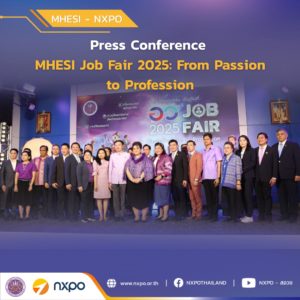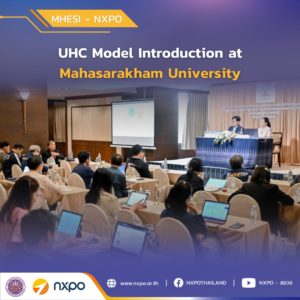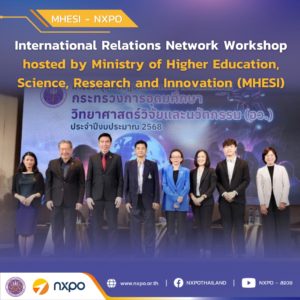
NXPO President Dr. Kitipong Promwong recently moderated Future Talk by NXPO – an open forum focusing on priority issues pertaining to higher education, science, research and innovation. The recent forum focused on manpower development to enable Thailand to achieve carbon neutrality and net zero emissions. Invited to speak at the forum were Prof. Dr. Sompong Klaynongsruang, Director of Program Management Unit for Human Resources & Institutional Development, Research and Innovation (PMU-B); Mr. Chaphamon Chantarapongphan, Committee Member of the Renewable Energy Association (RE100 Thailand); and Dr. Sate Sampattagul, Assoc. Prof. of the Department of Industrial Engineering, Chiang Mai University.

Dr. Kitipong opened the session with Thailand’s pledge given at the 2021 United Nations Climate Change Conference (COP26) that the country aims to achieve carbon neutrality by 2050 and net zero emissions by 2065. Cooperation from all sectors will be required to implement appropriate actions which include the transformation of the manufacturing and service industries, carbon credit trading mechanism, technology transfer and manpower development.

Mr. Chaphamon stated that industries – especially the ones with overseas headquarters and branches – are aware and active on climate actions as they have become a global trend and renewable energy holds the key to carbon neutrality. RE100 Thailand was established to facilitate Thai industries to achieve carbon neutrality and net zero emissions by connecting the demand and supply of renewable energy. In addition, the Federation of Thai Industries (FTI) has also launched an FTI platform for energy trading. However, the lack of green standard experts in Thailand has become a bottleneck and international experts have to be brought in at high costs.

In response to the challenge raised by Mr. Chaphamon, Prof. Dr. Sompong informed the forum that PMU-B and RE100 Thailand established a collaboration to strengthen human resource development in the area of green standards and regulations to support carbon neutrality and net zero emissions drive. The training course is being developed and expected to produce 200 experts in the next 5 years.

Dr. Sate raised three areas that require actions: 1) public awareness and education, 2) decarbonization in all sectors, including industry, agriculture and society, and 3) policy, measures and incentives provided by the government. He suggested a consortium formation – bringing together universities and industry working as a validation and verification body – to drive the manpower development initiative that PMU-C and RE100 Thailand is working on.

























